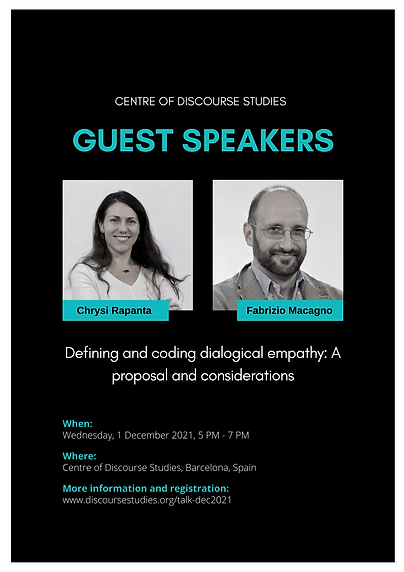COURSES AND WORKSHOPS
COURSES AND WORKSHOPS

WORKSHOPS, TALKS, AND COURSES
GUEST SPEAKERS:
Chrysi Rapanta
Fabrizio Macagno
"Defining and coding dialogical empathy: A proposal and considerations"
01 December 2021
17:00-19:00 (CEST)
Location:
Centre of Discourse Studies, Plaça del Bonsuccés, 7, entresuelo 6, 08001 Barcelona
Language: English
This is a free event, but registration is required:
https://forms.gle/dZzwgpM1d8iuQHjQ9
About the Speakers:

Chrysi Rapanta (Ph.D. in Communication, University of Lugano, Switzerland, 2011) is a senior researcher and invited assistant professor at the Faculty of Social Sciences and Humanities of the Universidade Nova de Lisboa. Her research is highly interdisciplinary, lying between argumentation methods applied in education, innovative teaching with and without technologies, and intercultural literacy/communication. She is author of several papers in the fields of education, philosophy and communication. She has published in major Quartile 1 journals such as: Review of Educational Research, Educational Research Review, Teaching & Teacher Education, Educational Psychology Review, and British Journal of Educational Technologies.

Fabrizio Macagno (Ph.D. in linguistics, UCSC, 2008) works as an assistant professor in the departments of Philosophy and Communication at Universidade Nova de Lisboa. He is author of several papers on definition, informal fallacies, argumentation schemes, and dialogue theory published on major international peer-reviewed journals. His most important publications, in addition to the Logic of Academic Writing (Wessex 2019) include the books Argumentation Schemes (CUP 2008), Emotive language in argumentation (CUP 2014), Interpreting straw man argumentation (Springer 2017) and Statutory interpretation: Pragmatics and argumentation (CUP 2021). He has been publishing extensively on the use of logical methods and theories for the improvement of communication in crucial areas of practice, such as education, law, and medical discourse.
Talk description:
Empathy, broadly defined as the ability to experience another’s emotions and perceptions, is one of the major attitudes and actions underpinning an individual’s participation in dialogue across diversity. The goal of this presentation is to operationalize empathy as a discursive construct, manifested in children’s and adolescent’s dialogic interactions. A coding scheme is developed based on three distinct steps. First, a review of the operational definitions of empathy is conducted, to capture how its related values, skills, and dispositions have been detected thus far. Second, the definitory elements resulting from this review are captured in the dialogical construct of transactivity, as manifested through two main discursive operations namely other-orientedness and relevance. Finally, a coding scheme capturing both first- and second-order constructs is proposed, developing the insights from the previous steps. This coding scheme is intended to detect and measure how students of different educational levels mirror the abilities that characterize empathy in their dialogues. The coding scheme has been recently applied to an extensive corpus of teacher-led and small group discussions among pre-schoolers, primary and secondary school students from five different countries (England, Germany, Portugal, Cyprus and Spain), engaging in the same dialogical activities as part of a European project. The potentiality of the dialogic empathy coding scheme for other contexts is also discussed.
